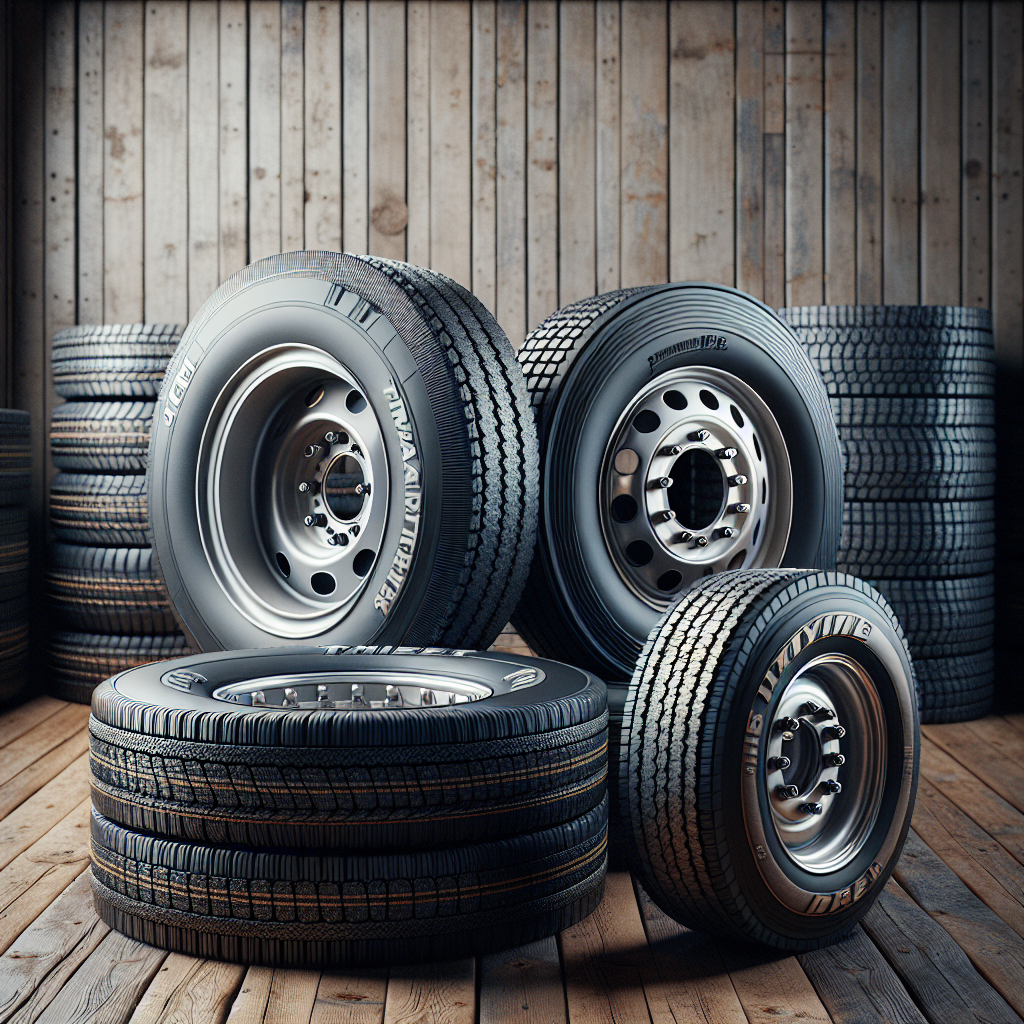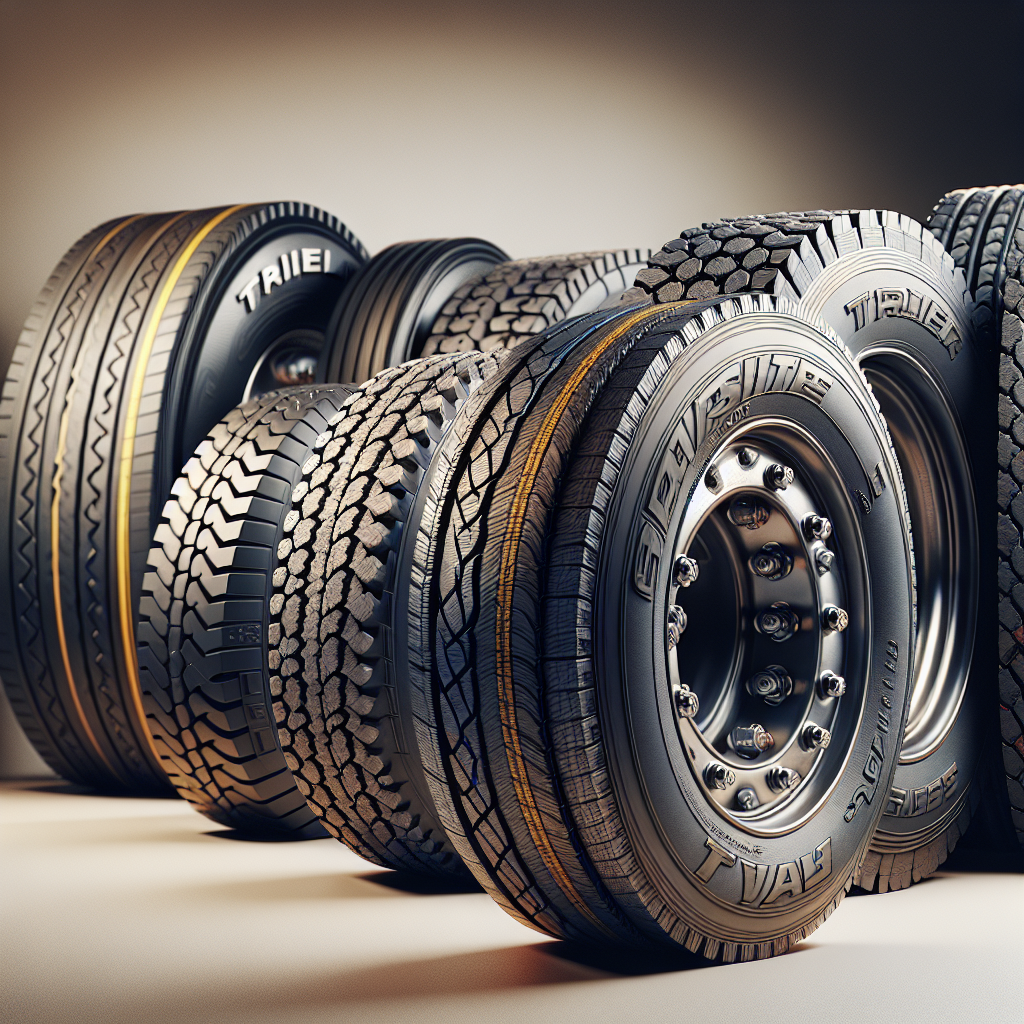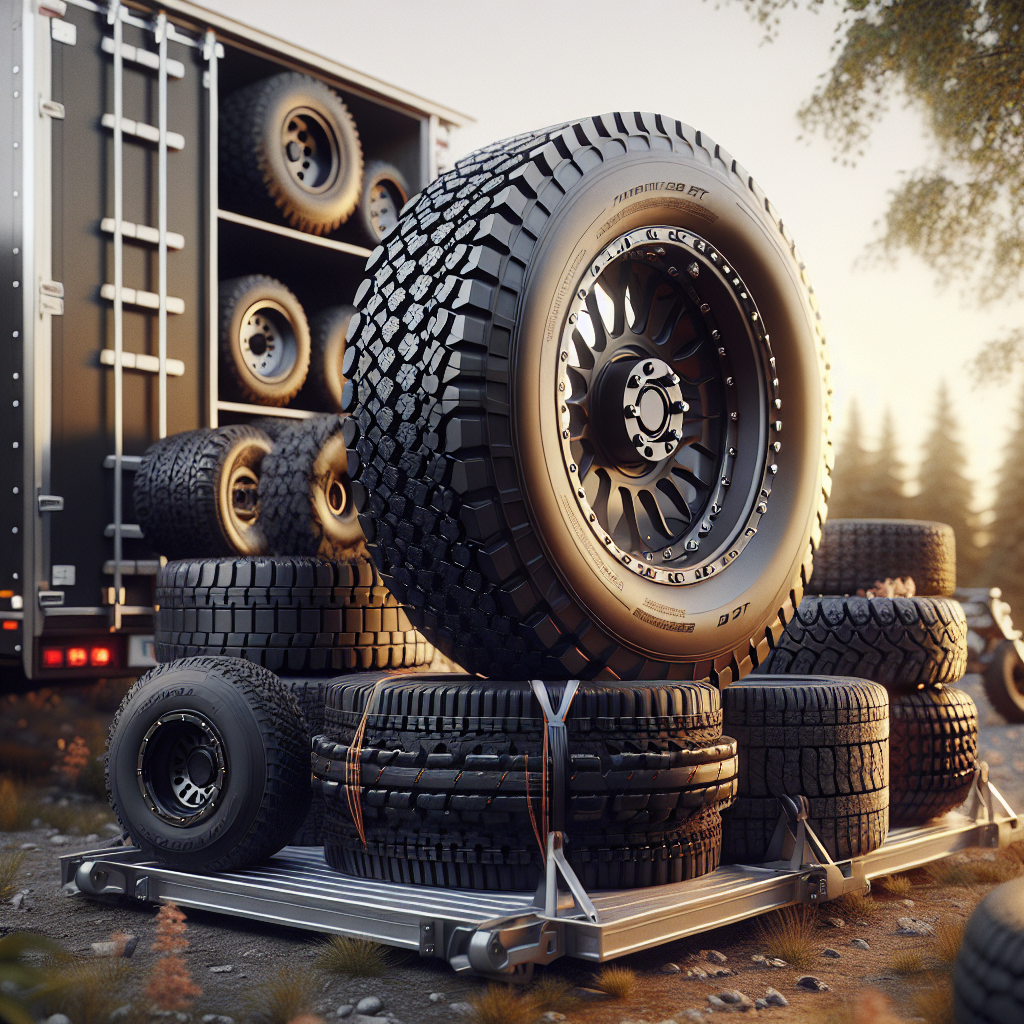When it comes to trailer tires, understanding the different types available is crucial for ensuring the safety and efficiency of your towing experience. Each tire type is designed for specific applications and conditions, which can significantly impact performance.
Here are some key types of trailer tires:
- ST (Special Trailer) Tires: These tires are specifically engineered for trailers and are designed to handle heavy loads. They often have reinforced sidewalls and a higher load capacity than standard passenger tires.
- LT (Light Truck) Tires: While not specifically made for trailers, light truck tires can sometimes be used on trailers. However, they may not provide the same level of stability and performance as ST tires.
- Bias Ply vs. Radial Tires: Bias ply tires have a crisscross tread pattern, offering a softer ride but less stability during high speeds. Radial tires, on the other hand, feature a tread that runs radially around the tire, providing better handling, fuel efficiency, and durability.
- All-Season vs. Specialty Tires: All-season tires are versatile and can perform well in various conditions, while specialty tires are designed for specific environments, such as off-road or winter conditions, ensuring optimal performance based on your needs.
Choosing the right type of tire for your trailer is essential for avoiding potential failures and ensuring a smooth ride. Regularly monitoring your tire condition and loading capacity can help maintain performance. Tow with peace of mind, knowing that trailerwatchdog is standing guard.
Key Features of Trailer Tires Explained

Understanding the key features of trailer tires is vital for making informed choices that enhance safety and performance. These features define how well a tire can perform under various conditions, ensuring a reliable towing experience.
Here are some essential features to consider when evaluating trailer tires:
- Load Capacity: Each tire has a specified load rating, indicating the maximum weight it can safely carry. It’s crucial to match the tire’s load capacity with your trailer’s weight for optimal performance.
- Tread Design: The tread pattern affects traction, stability, and handling. A well-designed tread provides better grip on different surfaces, reducing the risk of skidding or losing control.
- Sidewall Strength: The sidewalls of trailer tires are engineered to withstand heavy loads and resist damage. A strong sidewall helps prevent blowouts and maintains tire integrity during operation.
- Tire Pressure: Maintaining the correct tire pressure is essential for safety and fuel efficiency. Under-inflated tires can lead to poor handling, while over-inflated tires may wear out prematurely.
- Temperature Resistance: Trailer tires are often subjected to extreme heat from friction and the environment. A tire’s heat resistance can significantly impact its lifespan and performance, making it a crucial feature to consider.
By understanding these key features, you can select the right trailer tires that meet your specific needs and ensure a safer towing experience.
Importance of Proper Trailer Tire Maintenance

Proper maintenance of trailer tires is essential for ensuring safety, performance, and longevity. Neglecting tire care can lead to significant issues, including blowouts, reduced fuel efficiency, and increased repair costs.
Here are some important aspects of trailer tire maintenance to keep in mind:
- Regular Inspections: Conduct routine checks for signs of wear, such as cracks, bulges, or uneven tread. Identifying these issues early can prevent more severe problems down the line.
- Tire Rotation: Just like with vehicle tires, rotating trailer tires can help achieve even wear. This practice extends the life of the tires and improves overall performance.
- Monitoring Tire Pressure: Maintaining proper tire pressure is crucial. Tires that are too low in pressure can overheat and fail, while over-inflated tires can suffer from premature wear. Utilize a reliable pressure gauge to check regularly.
- Alignment and Balancing: Ensure that your trailer is properly aligned and balanced. Misalignment can lead to uneven tire wear and affect towing stability.
- Cleaning and Storage: Keeping tires clean and storing them in a cool, dry place can help prevent damage from UV rays and other environmental factors. Proper storage is especially important during off-seasons.
By prioritizing these maintenance practices, you can significantly enhance the performance and safety of your trailer tires, ensuring that your travels are smooth and worry-free.
Common Issues with Trailer Tires and Solutions

Understanding the common issues that can arise with trailer tires is vital for any owner. Being aware of these problems allows for timely intervention and can save you from costly repairs and accidents. Here are some frequent tire issues and their effective solutions:
- Blowouts: One of the most alarming issues is a tire blowout. This typically occurs due to under-inflation, excessive wear, or hitting a pothole. To prevent blowouts, regularly check tire pressure and inspect tires for signs of wear.
- Uneven Wear: Tires can wear unevenly due to misalignment or improper inflation. This can lead to compromised handling and safety. Regularly rotate your tires and ensure proper alignment to mitigate this issue.
- Cracking and Dry Rot: Exposure to UV rays and harsh weather can cause tires to crack or develop dry rot. To combat this, keep tires covered when not in use and store them in a cool, shaded area. Regular inspections will help catch these issues early.
- Loss of Traction: Worn treads can lead to reduced traction, especially in wet conditions. Ensure that your tires have adequate tread depth and replace them when they become too worn to provide safe handling.
- Punctures: Nails or debris on the road can cause punctures, leading to slow leaks or complete tire failure. Carry a spare tire and a repair kit, and consider professional help if a puncture is too severe to fix.
By addressing these common tire issues proactively, you can enhance the safety and reliability of your trailer, ensuring a smoother journey on the road.
Safety Tips for Trailer Tire Usage

Ensuring the safety of your trailer tires is crucial for the overall performance and reliability of your towing setup. Here are some essential safety tips for trailer tire usage:
- Regular Inspections: Conduct thorough inspections before each trip. Look for signs of wear, cracks, or foreign objects lodged in the tires. Regular checks can prevent unexpected failures on the road.
- Maintain Proper Tire Pressure: Keeping tires inflated to the manufacturer’s recommended pressure is key for optimal performance. Under-inflated tires can lead to increased wear and blowouts, while over-inflated tires can reduce traction and stability.
- Load Management: Ensure that your trailer is loaded within the specified weight limits. Overloading can cause excessive strain on the tires, leading to premature wear and potential failure. Distribute weight evenly to maintain balance.
- Choose the Right Tires: Select tires that are appropriate for your trailer’s usage and weight. Consider specialized tires designed for trailers, as they are built to handle specific loads and conditions better than standard vehicle tires.
- Monitor Temperature: High temperatures can indicate issues such as under-inflation or excessive load. Using a tire monitoring system can help you keep track of tire temperatures, alerting you to potential problems before they escalate.
- Replace Worn Tires: Don’t wait until tires show significant wear or damage. Regularly check tread depth and replace tires that are worn down to 2/32 of an inch or less to ensure safe traction and handling.
By following these safety tips, you can significantly reduce the risk of tire-related incidents and enhance the longevity of your trailer tires, making your travels safer and more enjoyable.
Upgrading to Smart Trailer Tire Monitoring
In today’s fast-paced world, upgrading to a smart trailer tire monitoring system can significantly enhance the safety and performance of your trailer. These advanced systems provide real-time data on tire pressure and temperature, enabling you to monitor your tires more effectively than ever before.
With smart monitoring, you can:
- Receive Instant Alerts: Get notifications directly to your smartphone or dashboard if tire pressure or temperature falls outside the safe range. This allows you to address potential issues before they lead to catastrophic failures.
- Enhance Fuel Efficiency: Properly inflated tires improve fuel efficiency, saving you money in the long run. Smart systems help maintain optimal tire pressure, which can result in better gas mileage.
- Extend Tire Life: By continuously monitoring your tires, you can ensure that they are always in good condition, reducing wear and tear. This leads to longer-lasting tires, which means fewer replacements and lower costs.
- Improve Safety: Knowing the real-time status of your tires adds an extra layer of safety. It allows you to make informed decisions while traveling, minimizing the risk of accidents due to tire failure.
Investing in a smart trailer tire monitoring system will not only enhance your peace of mind but also improve the overall performance of your trailer. Tow with peace of mind, knowing that TrailerWatchdog is standing guard. Discover how we can help you turn your trailer into a smart trailer today by visiting trailerwatchdog.com.








